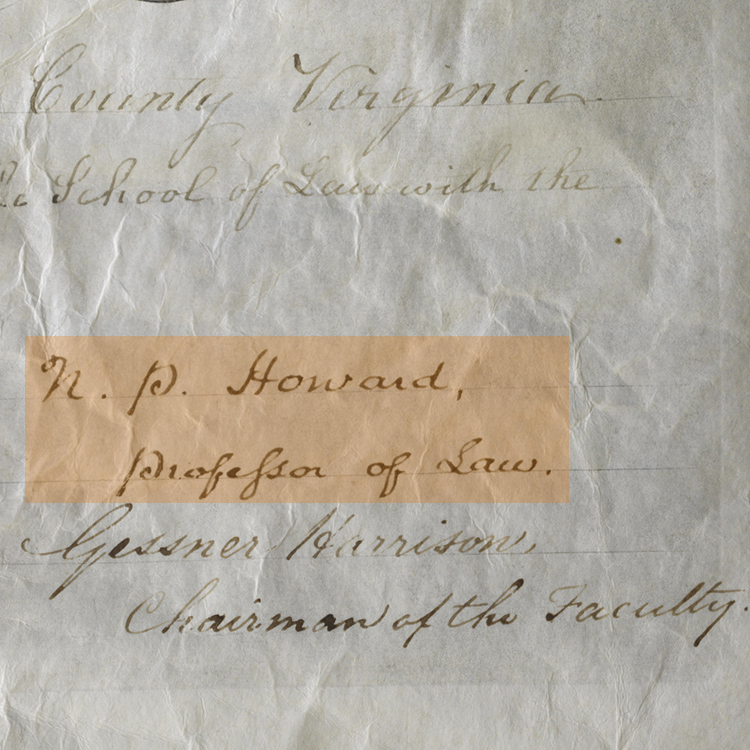On November 23, 1840, the Board of Visitors selected Nathaniel Pope Howard to replace Professor John A. G. Davis just two weeks after Davis was shot and killed by a student on the Lawn.[1] A Richmond native, Howard grew up around lawyers. His father, Thomas C. Howard, was Clerk of the Hustings Court. As a boy, Howard spent time in his father’s office, where he met his future mentor, Conway Robinson, then his father’s deputy clerk.[2] He entered Hampden-Sydney College in 1825 and earned an A.B. in 1828.[3] Upon graduation, Howard returned to Richmond to begin his legal career as an apprentice to Robinson, who later wrote that Howard greatly assisted him in his publications The Practice in the Courts of Law and Equity in Virginia (1832-1839) and The Principles and Practice of Courts of Justice in England and the United States (1854).[4] When he completed his apprenticeship, Howard became deputy clerk under his father, and succeeded his father upon his death in 1834. Howard served as Clerk of the Hustings Court until 1836, when he left to establish a private practice in Richmond.[5]
When Howard was recruited by the Board of Visitors of the University of Virginia in 1840, he received a warm send-off by the Richmond Enquirer. On November 27, 1840, the paper declared: “The modesty of Mr. Howard; the seclusion, which is incident to his laborious habits of study, have in part veiled his merits from the public eye. But the prominent station which he is about to assume, will bring out his character in bold relief.”[6] However, Howard and the Board of Visitors had mutually agreed upon a one-year contract, with Howard teaching only until the end of the academic year.[7] Henry St. George Tucker would replace him.
Howard returned to his private practice in July 1841. Shortly afterward, Judge John Robertson offered Howard a position as Clerk of the Richmond Superior Court of Chancery, which he accepted. He also served as the Clerk of the Virginia General Court. In 1851, the Virginia General Assembly established a new circuit court system, and Howard’s two positions were dissolved. He then moved back to private practice.[8]
From 1850 to the end of the Civil War, U.S. Census Slave Schedules indicate that Howard enslaved at least seven men, women, and children and employed them in various capacities. In 1850, Howard enslaved one 55-year-old man, two women ages 45 and 53, and two girls ages 8 and 10.[9] In 1860, Howard enslaved one 45-year-old woman, whom he rented out to W. W. Snead, a Richmond locksmith.[10] In an 1867 advertisement in the Richmond Dispatch, Snead sought a “middle-aged woman […] to wait on a small family and to cook, wash, and iron.”[11] It is possible that the woman Howard rented out to Snead in 1860 performed that same work.
Another advertisement in the Richmond Dispatch, dated January 30, 1864 and paid for by Howard, reveals the name and supposed demeanor of one individual whom Howard enslaved. Landon, a 27-year-old man whom Howard describes as “black and tolerably likely,” reportedly left his work at the tobacco factory Childrey & Jones on January 25th and “has not been seen or heard from since.” Howard reported that Landon had “a wife and children, who live[d] in Adams’s Valley” and supposed that he could be “lurking about the city, though it is quite as probable that he is attempting to make his way into enemy’s lines.”[12]
While Howard maintained his private practice and managed the enslaved individuals that made up his estate, he received multiple nominations for various judgeships, from Judge of the Hustings Court to Army Judge for the Confederacy.[13] There is no record that he accepted any of these nominations. By 1870, he had formed a partnership with Powhatan Roberts, another Richmond lawyer, to form Howard & Roberts. Howard and Roberts were presenting a case at the Richmond Capitol building on April 27, 1870 when they, along with 62 other individuals, died in the collapse of the second floor onto the first.[14] His sudden death encouraged his colleagues to publish solemn remarks which reveal their admiration of his character. In a May 1870 article of the Richmond Dispatch, members of the Virginia Bar published this statement: “In the death of N. P. Howard we deplore the loss of one whose life had been devoted with tireless energy to the study of the great principle of law.”[15]
[1] Board of Visitors minutes, 23 November 1840, JUEL Resources.
[2] Shepard, E. Lee, "Nathaniel Pope Howard," in Legal Education in Virginia 1779-1979: A Biographical Approach (Charlottesville: University Press of Virginia, 1982), 305.
[3] General catalogue of the officers and students of Hampden-Sidney College, Virginia, 1776-1906 (Whittet & Shepperson, Richmond: 1908), 65.
[4] Robinson, Conway, "Appendix C" in The Principles and Practices of Courts of Justice in England and the United States 7 (Richmond: 1874), 1098, footnote 1.
[5] Shepard, "Nathaniel Pope Howard," 306.
[6] "Professor of Law in the University of Virginia," Richmond Enquirer, 27 November 1840.
[7] Board of Visitors minutes, 23 November 1840, JUEL Resources.
[8] Shepard, "Nathaniel Pope Howard," 306-307.
[9] "Nathaniel P. Howard—Henrico—Virginia," The National Archive in Washington DC; Washington, DC; NARA Microform Publication: M432; Title: Seventh Census of the United States, 1850, ancestry.com.
[10] "N P Howard—Henrico—Virginia," The National Archive in Washington DC; Washington, DC; NARA Microform Publication: M653; Title: Seventh Census of the United States, 1860, ancestry.com.
[11] "WANTED, A MIDDLE-AGED WOMAN," Richmond Enquirer, 11 September 1867.
[12] "Runaways," Richmond Dispatch, 30 January 1863.
[13] "Nathaniel P. Howard for Hustings Judge," Richmond Dispatch, 21 April 1860 and The National Archive in Washington DC; Washington, DC; NARA Microform Publication: M346; Title: Confederate Papers Relating to Citizens or Business Firms, compiled 1874 - 1899, documenting the period 1861 - 1865, fold3.com.
[14] "Horrible Calamity," Richmond Dispatch, 28 April 1870.
[15] "Meeting of the Bar," Richmond Dispatch, 2 May 1870.

